Q: How is PrivatBank coping with the economic challenges in Ukraine?
A: Like all Ukrainian banks, PrivatBank faces the pressures of the negative external environment, the challenges of the drop in production and the resulting payment problems. But now we see some signs of stabilisation - the exchange rate of the local currency is strengthening and the outflow of deposits has slowed. The National Bank of Ukraine did not allow major defaults in the banking sector and provided refinancing to banks during this difficult period.
Q: What is PrivatBank's funding strategy?
A: PrivatBank's main source of funding is from the deposits of individuals and corporate clients. As of April 1, 2009, individuals' deposits made up 37% and corporate clients' deposits accounted for 28% in the bank's funding structure. PrivatBank is the largest holder of deposits in Ukraine with a market share of nearly 16%. This year, the bank continued to focus on attracting the funds of individuals and corporate clients. Additional funding support has been provided by central bank credit lines of Hrv8.4bn ($1.1bn), which were established for PrivatBank but have not been fully utilised. The bank's international debt is quite low and it has a well-balanced repayment schedule with only two public deals outstanding: $500m Eurobonds 2012 and subordinated debt 2016 (call option 2011).
Q: What is PrivatBank's business strategy for 2009?
A: This year our strategy is focused first on increasing liquidity - the capital of the bank has been increased by Hrv2.1bn in the past month. Since the beginning of the credit crisis, PrivatBank has concentrated on timely payments so that clients could be sure of the reliability of our performance, and we have supported the businesses of many clients in difficult conditions.
Our second objective is to improve the quality of our loan portfolio using a weighted approach to assessing a client's ability to pay. PrivatBank is the leader in retail loans in Ukraine but the sharp depreciation of the local currency and mass redundancies have not critically affected the quality of our credit portfolio.
Why? We created efficient processes to work with borrowers, which, on one hand ensures the legal protection of the bank's interests and on the other hand supports clients. In this way, the bank diversified its portfolio and cut the average loan amount, which for individuals was $288 and for corporate clients was $375,000, as of January 1, 2009. Besides, the implementation of a payment strategy for all clients is important for us. Every day, PrivatBank maintains an average of 1.2 million client contacts so it generates a stable flow of revenue through processing a huge number of small transactions.
Q: Can you explain PrivatBank's structure and how it relates to PrivatGroup?
A: PrivatGroup comprises four banks; industrial companies are not and have never been in the group. The bank's corporate structure is clear and transparent - it is disclosed to the level of individual owners. The bank's corporate structure was disclosed many times in the prospectuses (including 144A Eurobonds issued for US investors) under numerous international deals. Prospectuses for Eurobond and subordinated debt issues are available on Bloomberg.
Due to PrivatBank's openness with investors, it has executed successful deals in the international market on favourable terms. It was the first Ukrainian bank to do a syndicated loan, issue Eurobonds and subordinated debt, and the only bank in Ukraine so far to do asset-backed deals.
Q: What is PrivatBank's approach to corporate governance?
A: Our approach to corporate governance is based on international standards and the rules and laws of Ukraine. The bank has taken some steps towards going public and we are now a public corporation, according to the requirement of the law, although we are not listed on the stock exchange.
Q: When do you expect growth to return in Ukraine?
A: We expect growth to return here in 2010. Ukraine is heavily dependent on the world's commodities markets. The country's main export industry is metallurgy, which provides up to 45% of hard currency inflows. Due to the world economic crisis, production in the metallurgical industry had significantly decreased.
But volumes have started to increase due to trade with Asian countries. The growth of exports to China has been very high, at volumes 6.3 times higher than in March 2008. It is too early to say whether this is a stable trend but due to the devaluation of the exchange rate Ukrainian exporters are more competitive.
On the whole, the growth of the economy depends on how quickly the world economy - and that of the US - recovers.












